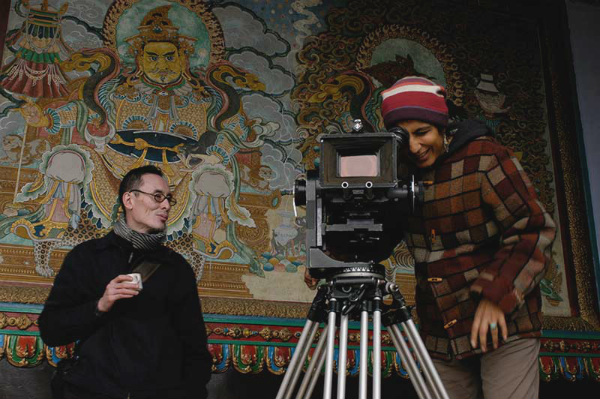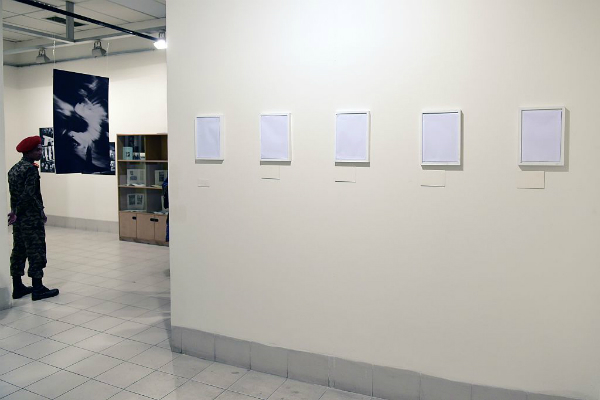Art & Exhibitions
Chinese Ambassador Pressures Dhaka Art Summit to Censor Artwork on Tibetan Self-Immolation
Artists Ritu Sarin and Tenzing Sonam have accused China of "bullying."

Photo: via Media for Change.
Artists Ritu Sarin and Tenzing Sonam have accused China of "bullying."

Lorena Muñoz-Alonso


Ritu Sarin and Tenzing Sonam’s Last Words are covered with white sheets at the Dhaka Art Summit on February 8, 2016.
Photo: MUNIR UZ ZAMAN/AFP/Getty Images.
While visiting one of the exhibitions at the Dhaka Art Summit (DAS) on Saturday morning, the Chinese ambassador to Bangladesh, Ma Mingqiang, felt provoked by one of the artworks on display and demanded it be covered up. The organizers complied, thus prompting accusations of censorship.
The work in question is entitled Last Words and was created by India-based filmmakers Ritu Sarin and Tenzing Sonam. It comprises photographs of letters written by five of the 149 Tibetans who have self-immolated since 2009 to protest against Chinese occupation.
“They had to be covered because the Chinese ambassador to Bangladesh found the works offensive, during a visit to the summit on Saturday,” Sonam told the Indian Express. “We were told by the curator [Diana Campbell Betancourt] that he exploded as soon as he saw it and asked the works to be removed immediately or face consequences,” he added.
Sazzad Hossain, head of administration at DAS, told the AFP, “The Chinese ambassador was offended when he saw the artworks. He sent us a mail in protest and asked us to remove the works. And we’ve covered up the five works with white sheets.”
“It was intimidating. I, personally, have started to feel threatened since then,” another DAS organizer said, on condition of anonymity.
According to NDTV, Bangladesh is an ally of China, which in exchange is funding many of the nation’s key infrastructure projects.

Tenzing Sonam and Ritu Sarin in Dharamsala, India.
Photo: via Media for Change.
The filmmakers were informed of the situation on Saturday evening. They traveled from Dkaha to Delhi, where Sarin is based, on Sunday morning, but were in constant dialogue with the curator and the summit founders Nadia and Rajeeb Samdani.
Sarin told AFP that they had agreed to have the work be covered up, rather than removed. “We did not want the Dhaka Art Summit to face the possibility of being shut down as we felt that the event provided an important platform for artistic exchange in South Asia,” she explained.
“We understand their position. They are trying to frame an appropriate response. With an event of such magnitude, one can’t really take any chance,” Sonam, a Tibetan living in exile, told the Indian Express, chiming in with Sarin.
But, despite their agreement, Sarin used harsh words to describe the incident.
“This is bullying. The Chinese are asking for the works to be removed in a foreign country. We have just taken five letters that are actually available online; it is not even an interpretation,” she said.
When contacted for comment, a DAS spokeperson told artnet News: “They will not make any comment about what happened, other than to say that some individuals had objected to the work and so, with the artists’ permission, they decided to cover the works.”

Dhaka Art Summit chief curator Diana Campbell Betancourt
Photo: Shumon Ahmed.
Last Words was exhibited at the Bangladesh Shilpakala Academy—which also hosted 17 solo projects, five exhibitions, eight performances, screenings, and events. It had previously been exhibited in December as part of their solo exhibition “Burning Against the Dying of the Light” at Khoj Studios in Delhi.
Sonam claimed that this was not the first case of censorship of Tibetan-focused artwork in Bangladesh by Chinese authorities. In 2009, the Chinese embassy, Sonam recalled, had asked the government to shut the exhibition “Into Exile | Tibet 1949 – 2009,” which had been organized by the Students for a Free Tibet in Bangladesh.